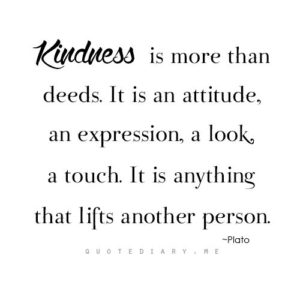 I have a memory from when I was a child of playing outside my house when a woman came by. I do not remember anything about this woman – what she looked like, what she may have said, or how she acted. What I do remember is that my father brought this stranger, with whom something was not quite right, into our house, to find her some help.
I have a memory from when I was a child of playing outside my house when a woman came by. I do not remember anything about this woman – what she looked like, what she may have said, or how she acted. What I do remember is that my father brought this stranger, with whom something was not quite right, into our house, to find her some help.
Ever the cautious and sensitive child, I remember feeling uncomfortable and unsure whether this was the safest thing he should do. What also remained with me, however, was this sense of awe that he would step away from what I knew (and probably what he taught me) were the basic rules of personal safety and protection in order to help a stranger. Not only did he talk to someone we didn’t know, he actually brought her into our home. What if she wouldn’t leave? To the child’s eye, I believe I felt my own safety jeopardized at the expense of my father’s actions.
Fast forward 30 years or so, on a cold, grey, winter day, I am driving my red minivan along Cavendish boulevard, with my then 3-year-old and 1 ½ year old strapped in their car seats. As I stop at the light at the Mackle intersection, an elderly gentleman knocked on the passenger window.
“Can you please drive me to the Mount Sinai hospital?” he asked. “I have an appointment and the bus is not yet coming.” After a second hesitation, I responded “Sure,’ and he got into my car. The light changed, and I drove on.
He was not a chatty gentleman. He explained again that he had waited a long time for the bus and did not want to be late. I reiterated that I was heading in that direction anyhow, and by then we had arrived at the hospital. My usually talkative toddlers had remained mute for the entire episode. But as soon as our guest exited the vehicle, they were bursting with questions:
Who was that man? Where was he going? Why did he ask us for a lift?
Do you know him? Why did you agree to drive him?
The last two questions stopped me in my tracks. No, I didn’t know him. I agreed to drive him because my gut told me it would be ok and it was a kind thing to do. The words I had been using to teach my children about safety did not, in that moment, match my actions.
In this week’s parashah, Chayei Sarah, Abraham sends his servant to the city of Nahor to look for a wife for Isaac. The servant places himself by the water well and awaits the maidens of the town to arrive to draw water. He is looking for kindness, both from God who can help him be successful in his task and from the potential bride, who will demonstrate she is worthy of Isaac and his family.
And he said, “Lord, God of my master Abraham, may You so arrange it for me this day, and do kindness with my master Abraham…. Let it be that the maiden to whom I shall say, ‘Please tip your jug so I may drink,’ and who replies, ‘Drink and I will even water your camels,’ her will You have chosen for Your servant, for Isaac; and may I know through her that You have done kindness with my master.”
Rebecca arrives and when the servant runs to her and asks for water, she gives first to him and then brings water for his camels as well, just as he had hoped. Our rabbis taught that chessed – kindness – is one of our three most important characteristics along with modesty and compassion. In fact, in the Talmud we are taught (Suk. 49b):
Our rabbis taught: In three respects is gemiluth chassadim (acts of kindness) superior to charity; charity can be done only with one’s money, but acts of kindness can be done with one’s person and one’s money. Charity can be given only to the poor; acts of kindness both to the rich and the poor. Charity can be given to the living only, acts of kindness can be done both to the living and to the dead.
The impact of kindness is profound – on the recipient, on the donor. And on the observer.
I struggled for a long time after I drove that stranger to the hospital with my children in the car whether I had done the right thing. Was I leaving them with the message: do as I say, not as I do.
The parasha shows us that a large part of doing kindness is faith – faith in one’s own instincts and a belief that doing the right thing will be its own reward. We must always strive to teach our children to be safe and to protect themselves. But also to live in this world, to contribute to it, and to not shirk opportunities for kindness at the expense of fear.
Shabbat Shalom.



